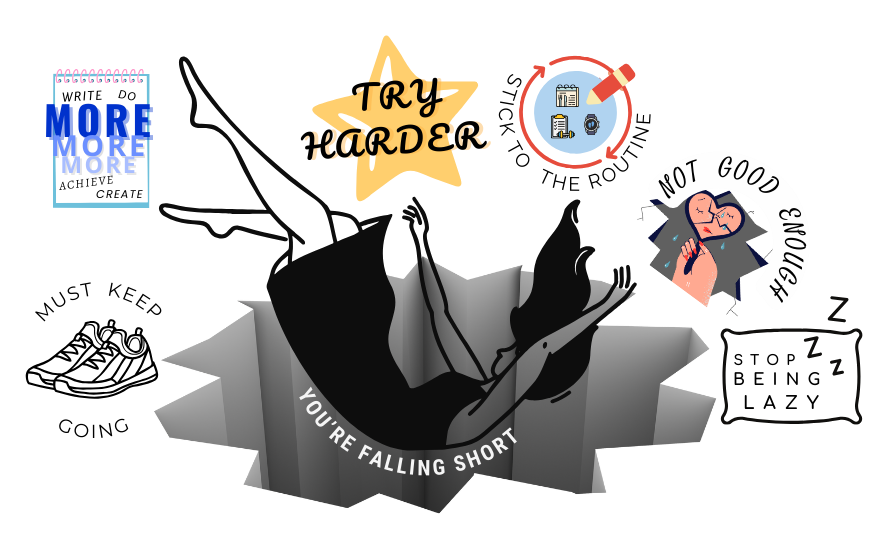Perfectionism has been both a motivator and a threat in my life. On one hand, it pushes me toward excellence; on the other, it traps me in a cycle of anxiety and self-criticism. This relentless pursuit has touched every aspect of my life, from work productivity to personal hobbies and even my health. My need for control has driven me to the edge, fueling my compulsive exercise and disordered eating behaviors. As I continue to grow and learn more about myself, I hope to embrace my imperfections and find inner peace.
The Pursuit of Perfection
Academic Excellence
For as long as I can remember, I’ve chased the elusive goal of perfection. As a lonely child, setting high standards for myself and achieving goals offered a sense of comfort and validation. In school and college, I was always the straight-A student. I spent countless hours alone in my room, buried in books and assignments. Yet, even when I got the A or received praise from my teachers, I still didn’t feel good enough. This constant drive for academic excellence became a coping mechanism, a way to prove my worth and fill the void of loneliness.
Imposter Syndrome in the Corporate World
This feeling of inadequacy followed me into my professional life. Landing my first job in the corporate world, I immediately felt like an imposter. I feared I would let someone down or that they would regret hiring me. As a new college graduate, I had a lot to learn and felt an overwhelming need to prove myself. Even though others seemed pleased with my work, I couldn’t escape the constant self-doubt.
The Social Burden of Perfectionism
In every area of my life, I’ve always felt like I needed to “act” a certain way, never truly belonging. Early on, I learned I couldn’t rely on others, but I could control my own actions, and therefore, my success or failure. I clung to the belief that once I reached a certain milestone, I would be happier. But that sense of fulfillment never came. No matter how much I accomplished, I couldn’t shake the feeling that I wasn’t doing enough.
I wore my work ethic and determination like badges of honor, convinced that the only person I needed was myself. My parents praised me for being mature and different from other kids, but deep down, I just wanted to feel normal. Yet, I never did. This sense of being misunderstood made it hard to let others in, isolating me further into my own mind.
The Paralysis of Perfectionism
Perfectionism confines me within my own mind, leading to mental paralysis and making it difficult to fully engage with life.
Fear of Failure
At the heart of this cycle is an intense fear of failure. Each new challenge is met with a relentless inner critic that questions my ability to succeed. But the anxiety isn’t just about making mistakes. It’s about how I see myself and how I think others see me. No matter what I do, I’m terrified someone is going to be disappointed in me. This mindset drives me to push myself more and more, often to the point of exhaustion.
Analysis Paralysis and Procrastination
I overthink and overanalyze every detail, trying to anticipate every possible outcome. While excessive preparation provides a false sense of progress, it often leaves me stuck in a loop of indecision and inaction. Procrastination offers a temporary escape from my anxiety, but, ultimately, it magnifies my stress as deadlines approach.
Self-Criticism and Burnout
With every perceived mistake or shortcoming, my harsh inner critic gets louder and louder. Any accomplishment is immediately overshadowed by the fear of what’s to come. The constant pressure to be perfect and the persistent self-criticism eventually lead to burnout, leaving me physically and emotionally drained.
This pattern permeates every area of my life. For example, activities that once brought me joy and fulfillment, such as exercising and blogging, have now become additional sources of stress and self-judgment. My dwindling energy and motivation has left me feeling disconnected from my passions, myself, and others.
The Paradox of Perfectionism
The National Institutes of Health conducted a study on the paradoxical nature of perfectionism and found a link to both eating disorders and exercise addiction — a reality I’ve faced firsthand.
Control and Coping
Perfectionism acts as a double-edged sword, offering a false sense of security while also creating more instability in my life. For instance, my desire for control and coping has led me down a dangerous path of compulsive exercise and disordered eating. What started as a way to manage stress and improve fitness has turned into an all-consuming obsession. Similarly, food is another source of control, as I meticulously plan and track every calorie, macro, and meal. Ironically, the more I strive for control, the more out of control I feel, fueling a cycle that’s hard to break.
Maladaptive Behaviors and Health
My reliance on these coping mechanisms has turned them into maladaptive behaviors, leading to detrimental effects on both my mental and physical health. What once served as healthy strategies have become unhealthy due to their excessive or compulsive nature. For example, over-exercising has led to constant fatigue and weakness, and my restrictive eating patterns have resulted in an unhealthy relationship with food. Together, these habits have caused hormonal imbalances and, potentially, significant long-term consequences, as I put my mind and body under chronic stress.
The Path to Personal Growth
Self-Efficacy
Perfectionism binds me to a strict set of standards, where anything less than flawless feels like a failure. To shift away from this rigid mindset, I need to adopt a more flexible approach. This means recognizing that mistakes and setbacks are natural parts of life, not reflections of my worth. Additionally, I must learn how to cope effectively and, more importantly, believe that I can adapt to life’s challenges. This concept, known as self-efficacy, is linked to increased productivity and better health outcomes. Letting go of control and being open to change and uncertainty are crucial for my personal growth and well-being.
Self-Compassion
To end this cycle of control and perfection, I must learn how to practice self-compassion. This means not letting my harsh inner critic dominate my thoughts and actions, allowing myself to rest when needed, and accepting that being flawed is part of being human. It’s about holding myself accountable while avoiding self-criticism, recognizing that every step forward—no matter how small — is worth celebrating.
Self-Acceptance
I know that harsh inner voice will never completely go away, but I hope to accept all parts of myself—the good and the bad. I want to stop putting so much pressure on myself to be perfect and just let myself simply be.
Finding Peace in Imperfection
Moving forward, I can either choose to keep aiming at the ever-moving target of perfection or embrace a balanced mindset that values progress, realizing that imperfection is a necessary part of growth.
Finding the line between health (fitness and nutrition) and harm (exercise addiction and disordered eating) is critical. This involves listening to my body and mind, recognizing when my actions are becoming compulsive, and allowing myself the freedom to rest and enjoy life without guilt. I also need to reconnect with my personal hobbies and passions, making space for them in my life and finding joy in them again.
Most importantly, to break free from these self-destructive patterns, I must continue to learn about myself. This includes understanding my triggers, acknowledging my strengths and weaknesses, and avoiding over-reliance on any single coping strategy. Life will inevitably present new challenges, and repairing my relationship with myself is crucial to navigating them effectively.
I’ve been at war with myself for most of my life, battling an inner critic that demands perfection. I hope that one day I can turn this adversary into a supportive ally — one that views my worth as the sum of my intrinsic qualities, not the product of performance metrics and numerical goals. Ultimately, I want to find peace within myself and in the present moment, rather than fixating on an ideal, distant future.



Techno rozen This is really interesting, You’re a very skilled blogger. I’ve joined your feed and look forward to seeking more of your magnificent post. Also, I’ve shared your site in my social networks!
Thank you so much!
BaddieHub I appreciate you sharing this blog post. Thanks Again. Cool.
I appreciate you taking the time to read it!